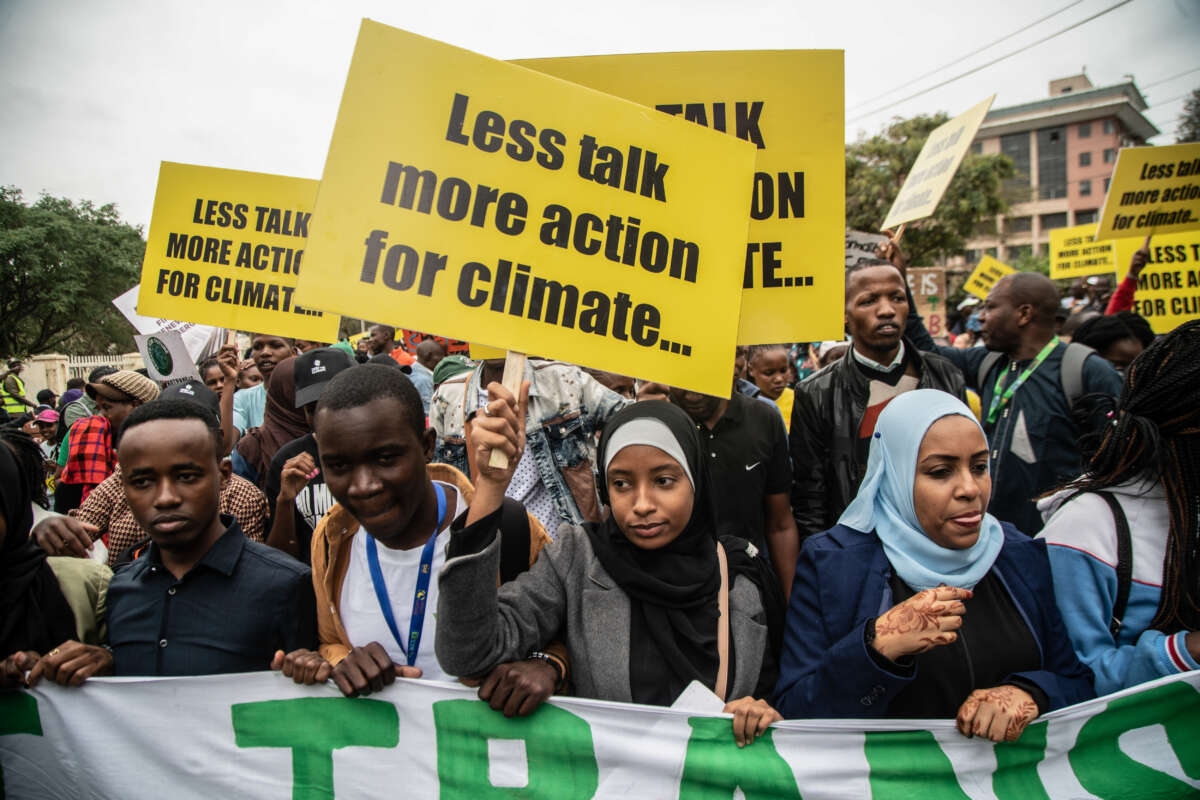Amid a worsening climate emergency and preparations for a pair of United Nations summits to tackle it, an analysis released Wednesday called out multiple countries including the United States for continuing to dump a collective $4.4 billion into fossil fuel projects abroad after pledging to stop such public financing by the end of last year.
Oil Change International (OCI) found that the United States, Finland, Germany, Italy, Japan, the Netherlands, and Switzerland have more than 20 fossil fuel projects awaiting final approval and 15 approved projects. Four U.S.-financed projects in Indonesia, Poland, Singapore, and South Africa are already approved and getting $1.5 billion.
Six other U.S.-backed projects — located in the Bahamas, Bahrain, Bulgaria, Guyana, Iraq, and Papua New Guinea — are still pending. There are also two approved liquefied natural gas (LNG) projects located in the United States but with a total of $472 million in German financing along with a pending U.S.-based project supported by Japan.
Germany also has an approved project in Bangladesh and pending projects in Brazil, Cuba, the Dominican Republic, Iraq, and Uzbekistan. Japan has approved projects in India, Indonesia, and Uzbekistan, and pending projects in Brazil, Jamaica, and Russia. Italy has approved projects in Indonesia, Peru, and Uzbekistan and pending projects in Brazil, Mozambique, Turkey, and Vietnam.
This financing is occuring despite the Statement on International Public Support for the Clean Energy Transition — often called the Glasgow Statement because it came out of the COP26 summit in Scotland — and a similar Group of Seven commitment. OCI, which has previously blasted “promise breakers” for neglecting these pledges, noted that “while the U.S. has reportedly adopted a policy to follow through on its commitments to end international public finance for fossil fuels, it is refusing to publish it.”
OCI public finance analyst Claire O’Manique declared Wednesday that “the U.S., Italy, and Germany are going rogue by backtracking on their commitment to end international public finance for fossil fuels. Public money that should be going to support a just transition to renewable energy is instead being pumped into more climate-wrecking fossil fuel projects, harming communities.”
“Other countries have kept their promise to end international public finance for fossil fuels,” she stressed. “This is already shifting billions of dollars towards clean energy. There needs to be accountability for signatories who go back on their word.”
Frontline community leaders also spoke out. Center for Environmental Law and Community Rights executive director Peter Bosip said: “The people of Papua New Guinea are already facing the full force of climate change. Rising sea levels, extreme weather events, and environmental degradation are already threatening many people’s existence and threatening our way of life. Papua LNG will add to and exacerbate this climate crisis — and financiers cannot, and should not, finance it.”
Anabela Lemos, director of Justiça Ambiental in Mozambique, charged that “rich countries are addicted to fossil fuels” and emphasized the importance of fighting against oil and gas projects.
“If there isn’t a strong backlash, the rest [of the world] will follow soon and then there will be no chance for vulnerable countries like Mozambique to deal with the ravages of the climate crisis,” Lemos warned. “Instead of supporting Mozambique to develop clean and just energy sources, these countries are pushing Mozambique down a fossil fuel development pathway.”
The campaigner took aim at the Italian export credit finance agency, Servizi Assicurativi del Commercio Estero (SACE), for its involvement in “the gas rush in northern Mozambique, which has led to human rights abuses, devastated lives, increased conflict and militarization, and oppression of communities, journalists, and civil society.”
Meanwhile, in the U.S. state of Texas, John Beard of the Port Arthur Community Action Network urged Germany “to stand with us against fossil fuels.”
“By investing in Port Arthur LNG, Germany is investing in yet another destructive project in a community that is already overwhelmed by the deadly and toxic pollution of the fossil fuel industry,” Beard said. “While the industry and shareholders will get rich, Port Arthur LNG will heap more destruction upon a predominantly black and brown community already facing cancer rates over two times higher average.”
“Our relatives and friends are dying daily from heart, lung, and kidney diseases caused by industrial pollution. But the people of the Gulf are fighting back!” he added. “Enough is Enough! No more sacrifice zones, no more fossil fuels — we refuse to be sacrificed! We will keep fighting to accelerate the transition to clean green renewables.”
The OCI analysis came as scientists confirmed that this summer has been the hottest on record and last year greenhouse gas concentrations, sea level, and ocean heat content hit historic highs. It was also published amid preparation for U.N. Secretary-General António Guterres’ Climate Ambition Summit in New York City beginning September 20.
Ahead of the summit, climate campaigners plan to descend on the U.S. city for the September 17 March to End Fossil Fuels, which is backed by 500 groups including OCI. The mobilization and meeting this month will be followed in November by COP28, the next U.N. conference for parties to the Paris climate agreement, hosted by the United Arab Emirates.
Trump is silencing political dissent. We appeal for your support.
Progressive nonprofits are the latest target caught in Trump’s crosshairs. With the aim of eliminating political opposition, Trump and his sycophants are working to curb government funding, constrain private foundations, and even cut tax-exempt status from organizations he dislikes.
We’re concerned, because Truthout is not immune to such bad-faith attacks.
We can only resist Trump’s attacks by cultivating a strong base of support. The right-wing mediasphere is funded comfortably by billionaire owners and venture capitalist philanthropists. At Truthout, we have you.
Our fundraising campaign is over, but we fell a bit short and still need your help. Please take a meaningful action in the fight against authoritarianism: make a one-time or monthly donation to Truthout. If you have the means, please dig deep.
